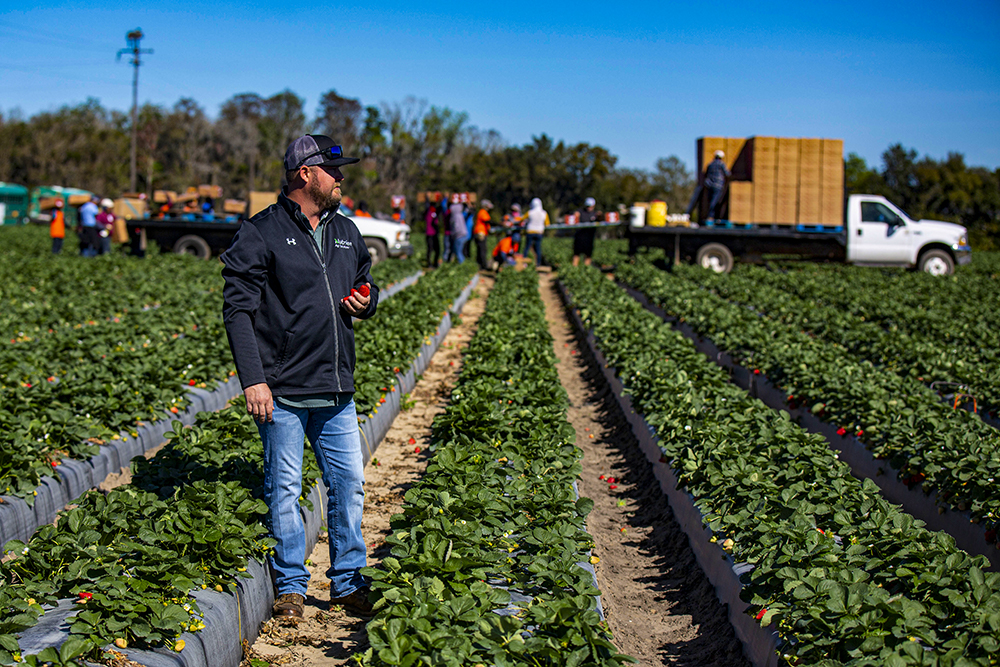Andy McDonald of Sweet Life Farms Describes Why Advocacy Efforts Are More Important Than Ever Before
by TERESA SCHIFFER
Sweet Life Farms in Plant City might be relatively new in terms of established farms, but General Manager and partner Andy McDonald is a seasoned pro when it comes to growing strawberries. McDonald is a fifth-generation farmer who has been farming berries in Plant City since the 1970s. He grew up farming with his father, and in 2011 established Sweet Life Farms with partners Steve Howard and Ron Lovell.
They started with 92 acres the first year, growing strawberries in the season and then various spring crops such as cantaloupe, watermelon, and bell pepper. Currently, McDonald and his team are farming 650 acres of strawberries. They are proud of the growth they have experienced over the past few years, despite the obstacles.
Farming is not an easy occupation, and certain challenges cause difficulties for every farmer — things like diseases, pests, and uncooperative weather. Regulations and labor are the two biggest roadblocks to success in the strawberry industry. Labor tends to be the highest cost for farmers, and this is especially true for strawberry farmers, who pretty much do everything by hand, from planting to harvesting.
Any farmer worth his salt recognizes the importance of protecting the natural environment. McDonald takes his role as a steward of the land very seriously at Sweet Life Farms, and has implemented the latest in technology to help increase the farm’s productivity while lowering its input load. Sweet Life Farms make use of things like soil moisture monitoring and weather stations to adjust accordingly. He knows the only way for a farm like his to have lasting success for future generations is by taking care of the land and water now.
“I would love to leave this legacy for them to carry on,” McDonald says.
He served as president of the Florida Strawberry Growers Association in 2012 and again in 2013, in addition to sitting on the Board several times. This Association represents the state’s strawberry industry, approximately 11,000 acres of which is located just in Hillsborough County.
The Association has been a huge advocate for the industry in the current trade war with Mexico. It is important that the industry have this representation in Washington to give voice to the growers.
In 1996, free trade was established between the U.S., Canada, and Mexico with the signing of NAFTA (North American Free Trade Agreement). Initially, this had very little impact on the U.S. strawberry industry. However, over the years as Mexico has created the infrastructure needed to do large-scale farming, the impact has been felt more and more. Mexico has the exact same growing season for strawberries, as well as several other commodities, as Florida does, meaning they are now a direct competitor.
Unfortunately for growers, strawberries are still considered a specialty crop and are not as important to the government as the larger commodities, such as corn and soybeans.
The FSGA supports free trade, and its goal is not to drive Mexican berries out of the U.S. at all, but rather to create a more level playing field for domestic and imported berries to compete on. One major difference between the berries coming from Mexico and those in the U.S. is that labor costs are drastically different between the two countries, resulting in lower costs for Mexican berries. Mexican laborers make pennies on the dollar compared to American laborers. Farm laborers in Mexico may make $15 to $20 per day whereas laborers on a farm such as Sweet Life are making that much per hour.
The FSGA has met with Vice President Mike Pence and the Department of Commerce seeking a way to rectify the situation. A tariff isn’t necessarily the right answer, either.
“We feel that the best thing to do is to restrict the amount of fruit that comes in,” McDonald explains.
Another issue affecting the cost of berries is the stringent safety standards that American farmers must adhere to. McDonald is proud of the fact that we have these regulations to protect consumers, saying, “I feed these berries to my kids every day.”
Mexico does not operate with the same safeguards in place. Control by the drug cartels affects many aspects of Mexican society, including growing practices. Pesticide usage and the use of biosolids as fertilizer can have a negative impact on the safety of Mexican berries.
Sweet Life Farms operated with Red Blossom for the first two years of business. Red Blossom is a company in California that distributes berries. When Red Blossom opted to focus more on the Mexican side of the business, Sweet Life Farms chose to find another distributor for their produce.
While Sweet Life focuses on strawberry production, they do still produce a few other crops, namely watermelons, blueberries, blackberries, and a variety of different vegetables. So the next time you are at your local grocery store or farmer’s market, check to see where your produce is originating from. Plant City is a bastion of fresh Florida produce, and there is a good chance your next flat of berries was grown at Sweet Life Farms.

